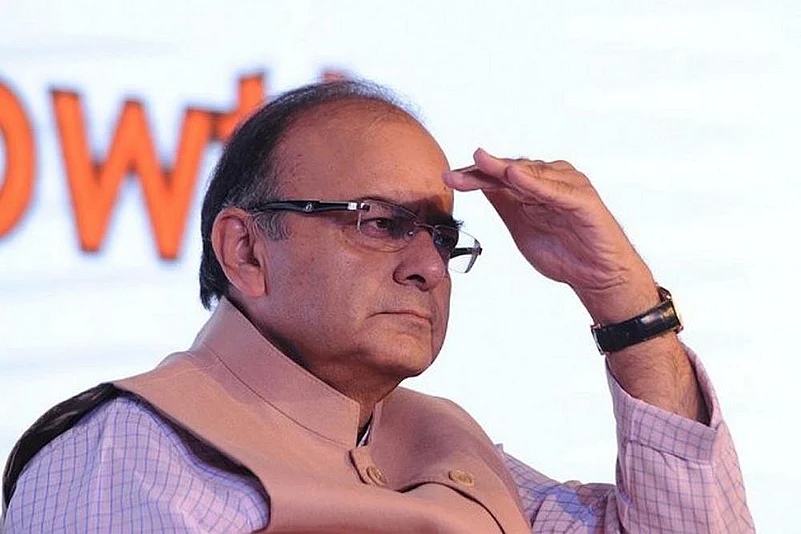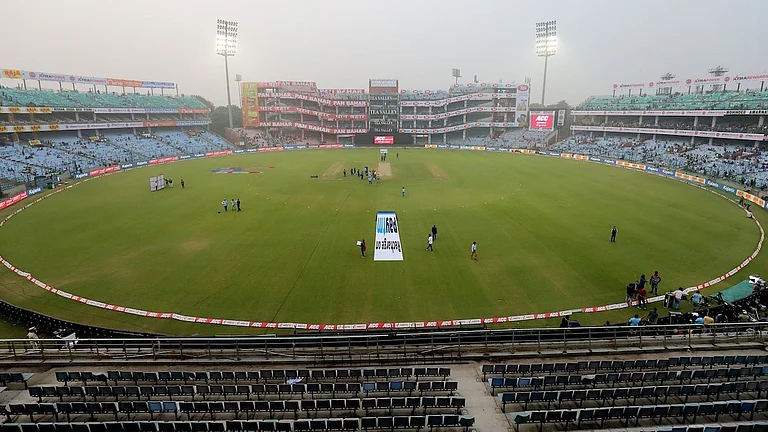A “phenomenal” 7.7 per cent growth rate of the Indian economy in the last quarter of the previous fiscal shows the country’s emergence after hiccups in the preceding two quarters owing to short-term effects of structural reforms, according to Union finance minister Arun Jaitley.
The latest results of the GDP data show India as the fastest-growing global economy—a “trend” that is likely to “continue in the next years”, the administrator-lawyer said on social media.
In a Facebook post, Jaitley recalled that the enforcement of the Insolvency and Bankruptcy Code in August 2016, followed by demonetisation three months thence and the implementation of the goods and services tax from July 1last year had made the second and third quarters of 2017-18 “challenging”. The 65-year-old BJP leader further said that “those who predicted a two per cent decline in GDP growth have been conclusively proved wrong”, taking a dig at one “distinguished predecessor” who “feared that he may have to live his future in poverty”.
Giving a throwback to a May 26 blog of his published this year on the Narendra Modi government’s structural reforms since 2014, Jaitley termed as “unprecedented” the social sector schemes and the rural development programmes of the current regime. “These involve legislations which are path breaking and development works in roads, railways, housing, power, sanitation which yield high social benefits require high level of government expenditure,” he added. “This type of high government spending promotes growth. This is what we are witnessing today.”
Analysing the GDP data, the minister said the construction sector is expanding by double digits, creating jobs and increasing domestic investment amid a surge in the FDI. “The IBC is unlocking the value in the non-performing assets. Fixed capital formation is growing. Manufacturing is expanding,” he said. “Expenditure on rural projects has increased in a big way. The social sector schemes, more particularly then financial inclusion programmes, have created a wave of self-employment.”
The Revenue Situation
If this trend continues over the next few years we are looking for a better future. The principal source of income of the Central and the State Governments is tax collection. If India remains a tax non-compliant nation, both Centre and state government will have very little to spend. They will borrow more and spend less.
Putting light on the revenue situation, he said demonetisation, GST, digitisation, AADHAR and the anti-black money measures are leading to gradual formalisation of the Indian economy. “Net direct tax collection has seen an unprecedented rise in the last few years,” he said. “We have now reached 6.86 crore income tax return filers last year. The number of income tax returns post demonetisation show a 25 per cent growth. Even the corporate returns have increased by 17 per cent.”
The GST after a few weeks of its implementation became problem free and is leading to higher tax collection. With higher revenues, the Government has been able to spend more on infrastructure, rural India and social sector schemes and yet maintained fiscal prudence and keeping the fiscal deficit on downward glide path.
Also, the last four years have seen “an improvement in Central Government’s tax-GDP ratio from 10 percent to 11.5 percent”, he said. “There is an increase of 1.46 percentage points. Almost half of this, 0.72 percent of GDP, accounts for an increase in non-oil tax-GDP ratio. The level of non-oil taxes to GDP at 9.8 percent in 2017-18 is the highest since 2007-08.”
On the flip side, India is “still far from being a tax-complaint society” on the non-oil taxes front. “Salaried employees is one category of tax-compliant assessees. Most other sections still have to improve their track record,” he noted. “The effort for next few years has to be to replicate the last four years and improve India’s tax to GDP ratio by another 1.5 per cent.”
“My earnest appeal, therefore, to political leaders and opinion makers is that the full and complete suggestion would be that evasion in the non-oil tax category must be stopped and, if people pay their taxes honestly the high dependence on oil products for taxation eventually comes down,” Jaitley added. “In the medium and long run upsetting the fiscal maths can prove counter-productive.
Assuring that the government will spend more on repayment of loans than on developmental works, he said the Indian rupee can become weaker, thus importing inflation into the country. “If inflows reverse, that could add to the adverse perception. The government would be spending less on infrastructure, rural India and social sector, thus making development suffer,” he noted. “Reliefs to consumers can only be given by a fiscally responsible and a financially sound Central government, and the states which are earning extra due to abnormal increase in oil prices.”


























